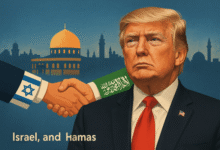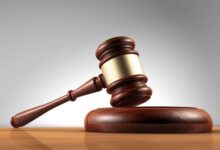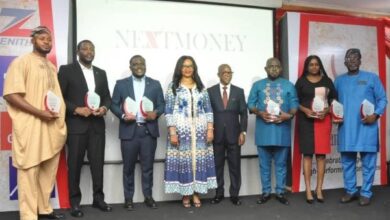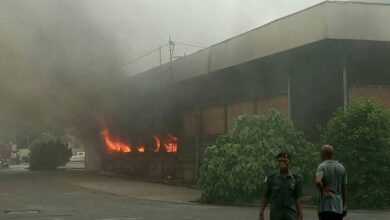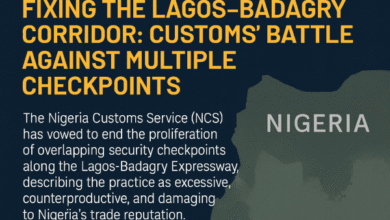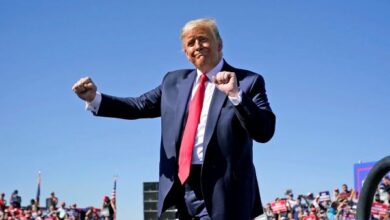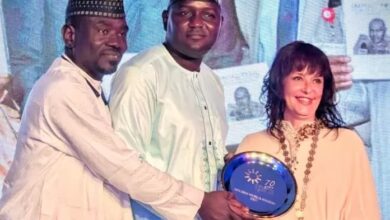2015 PORTENDS GREAT DANGER FOR NIGERIA IF… -Asiwaju Bisi Adegbuyi
 As tension intensifies ahead of the 2015 general elections, politicians and their various parties have been strategizing on how to corner the electorate and emerge victorious at the polls. BRANDPOWER sought the opinion of an astute Brand Nigeria stakeholder and respected political analyst, AsiwajuBisiAdegbuyi of the APC on the activities heralding the elections, the readiness of the electoral umpire and intricacies of the political actors. Here are his well articulated views.
As tension intensifies ahead of the 2015 general elections, politicians and their various parties have been strategizing on how to corner the electorate and emerge victorious at the polls. BRANDPOWER sought the opinion of an astute Brand Nigeria stakeholder and respected political analyst, AsiwajuBisiAdegbuyi of the APC on the activities heralding the elections, the readiness of the electoral umpire and intricacies of the political actors. Here are his well articulated views.
Excerpts:
What do you think the 2015 elections portends as regards the readiness of the electoral umpire towards delivering a brand of credible elections?
We can only be hopeful and optimistic that the electoral umpire will deliver on its mandate on the basis of giving the benefit of the doubt because if empirical evidence are anything to go by, we have every reason to be apprehensive that it may end up in a fiasco. However, if you do comparative analysis of what we had in the past; 2003, 2007 juxtaposed with 2011, there has been a massive improvement. Whether that improving has catapulted to an institution that can deliver the way the electoral agency in Ghana has delivered is another issue entirely. The registration of voters, distribution of PVC show clearly that INEC is not ready. We have praised INEC for conducting, credible elections in isolated states; Ekiti, Osun and Anambra where we moved the entire political machinery of INEC and gamut of security agencies to the aforementioned states. When you saddle that INEC with the responsibility of conducting elections all over Nigeria, your guess is as good as mine and this is based on empirical facts. We are under policed; the Nigerian army is under motivated. We can only continue to invest hope in INEC with the belief that somehow, they will be able to pull it through. But if we are not going to be recklessly optimistic, the signs are not good. I can also tell you that 2015 portends great danger for us in the sense that where you have a multi-ethnic and fractious country and there is a vicious contest for power between the north and the south; sometimes along religious lines, if not carefully handled, Nigeria may go up in flames.
How do you think we can prevent that?
People may not tell you but I can say this, if my party APC wins the 2015 election as I believe and hope we would win, for us to effectively run government will be difficult because the Niger Delta militants will go back to work. And the mainstay, the life wire of our economy will be completely destroyed. Obasanjo was a very strong president, but he had to eat humble pie to get some of these militants to Aso Rock and discuss with them. The rest they say is history. They are very powerful and rich now. When they were not this powerful, they brought Nigerian to its knees; the Nigerian Army couldn’t do anything. Now that they are very powerful, they have acquired sophisticated arms and are ready to take on the Nigerian state if you prevent President Jonathan from having his second term in office. The flip side of the coin is that if Jonathan wins, the present security challenges we have is likely to continue. The north wants the power badly and they don’t joke with power. A lot of analysts would not be able to say this but we need to start calling a spade a spade. I have no other country to run to, I just hope that miraculously before elections, we can get the awesome powers at the centre and dissolve same to states in Nigeria so that the stake at the centre where there is always a do or die contest will be greatly reduced. That is the temporary reprieve you can give to Nigeria.
 It appears you believe that the security agencies have a major role to play in conducting free and fair elections?
It appears you believe that the security agencies have a major role to play in conducting free and fair elections?
Clearly! Elections have become warfare in Nigeria and ipso facto militarized. In other jurisdictions, it is supposed to the fun; like let’s go to the market place of ideas where the voting public makes the final decision. The most danger to democracy in Nigeria in my humble view is when you have a largely illiterate voting public. I am not saying this to castigate anybody but when anybody votes because he has been given N500 or N1000, his stomach has been tagged.
Insecurity is the other of the day in Nigeria meaning the government has failed in its primary responsibility of protecting its citizens. It is not president Jonathan because I don’t discuss about personalities, I discuss ideas, issues and systems. I was a delegate to the national conference and I was one of those that stringently advanced the course of decentralization of police. Until when we do this and do away with one cap fits all, we would continue to have security challenges. Policing is a local issue anywhere in the world. If you bring a person to a place where he doesn’t understand the language, culture, terrain and the people are unfriendly to him, it would be very difficult for him to do his job.
I am not going to criticize President Jonathan for having failed abysmally to protect the citizens; however, he’s the president of my country, the buck stops on his table.
The recent distribution of voters’ cards faced series of challenges; do you think security had a role to play in that?
It’s a combination of both but if we must isolate the issue of PVC, INEC has been saddled with a responsibility that is gigantic and may well not be their fault; it is a systemic failure. They do staggered elections in America, but here, presidential, gubernatorial, national assembly elections are done at the same time with a week’s interval for one organization; INEC. You cannot give what you don’t have. If INEC does not have the capacity to contemporaneously conduct elections in 20 states at the same time, what do you expect? Professor Jega has said that come 2015, they will use naval and air force officers to conduct elections. We know our strength. They will stretch them thin. Hoodlums will be on the rampage. Political class won’t help matters. Politics has become warfare, politics and government are the most lucrative businesses in Nigeria. People who should not have anything to do with public governance are today holding very powerful offices. We know people who have been declared wanted abroad and who now hold powerful political office in Nigeria. A former DIG who became a senator was surprised to see people who were criminals in his cell as colleagues in the national assembly. So if you don’t change the political architecture and reform your political system, you will continue to go in circles. Note that the 1787 Philadelphia Convention of America was mainly about the political architecture of America. It was after they had gotten that right, that they got a fantastic secretary of finance who recognized their strength and on the basis of that political architecture set America on the journey of economic development.
Do you think the mutual suspicion along ethnic and religious lines led to the failure of INEC to advance with their plan to have additional 30,026 polling units?
The processes that led to the decision to create an additional 30,026 polling units according to privileged information at my disposal were less that salutary. A public institution must engender trust. If you embark on a plan of action and a critical section of the country suspects that what you want to do is to confer undue advantage to the other, then you are going further to weaken the foundation that is already damaged. Don’t forget, the southern people vehemently criticized Jega that he had an agenda. Despite his explanations, they had to stop it. The process leading to a particular cause of action are as important and if not more important than the result. The processes leading to an election are very important than the symbolic act of voting on the day of election.
 What do you have to say about the challenges the major parties seem to have had when it comes to conducting primaries?
What do you have to say about the challenges the major parties seem to have had when it comes to conducting primaries?
I can tell you this, we are yet to have full-blown democracy in Nigeria, at best we have civil rule. Politics in Nigeria has become mega bucks. Presidential system of government is not suitable for Nigeria and I will give you statistics. Of all the 20 most corrupt countries in the world, 17 of them practise presidential system of government including Nigeria. Of the 20 most developed countries in the world, 17 of them practice parliamentary democracy. The presidential system is expensive and if you don’t have money, you can’t be actively involved. We have shut out the critical segment of the Nigerian people; the intellectuals. We have laid a very bad precedence that people we should treat with scorn have become governors, senators. There is no way such political arrangement can deliver the greatest good to the greatest number. Therefore, it is systemic. The presidential system of government aids and abets corruption and impunity. Look at what just happened at the national assembly where the IG unleashed his men on lawmakers and came up with spurious defense. Where is that done? It is because he who pays the piper dictates the tune. So there can’t be internal democracy when some powerful guys have money and you want them to go contest election with people of modest means. Powerful politicians have high-jacked the whole process and I am not sparing anybody. I am not going to contest the next senatorial election because of stomach infrastructure, my circumstances and place of birth, and I don’t have access to mega bucks. Professor John Luis of John Hopkins University said there are no political parties in Nigeria and as a matter of fact described PDP as a lose patronage network. That is why in spite of the dismal performance of the PDP since 1999 it kept getting re-elected. You can’t have this type of political system and have parties that would have strong internal democracy mechanism. Therefore, the political parties are microcosm of the type of political system we run.
The way out is if you introduce the parliamentary system, you are going to reduce the influence of money and godfatherism because once you are popular in your local area, you can win election into the parliament and once you get to the parliament, people can decide that you are going to be the first among equals. This does not mean that all problems will be solved, but we must begin to embark on actions that will reduce some of these challenges; not compounding them because in my view, we are going from bad to worse.
Do you think the lack of ideological basis of political parties has aided cross-carpeting among Nigerian politicians?
The line between ideologies are thinning out even in the U.S. I am not worried about lack of clear cut ideologies in Nigerian politics because what ideology do you need to fix electricity for us? What ideology do you need to fix roads? Quoting Professor Tam David-West “Abuja-Lokoja was awarded by Obasanjo’s administration, he spent eight years in office, thenYa’adua and Goodluck spent another four years in office. If Goodluck is re-elected, he would be spending another eight years; this amount to twenty years and the 180km road is yet to be completed.” Whether you have ideology or not, let your fundamental law clearly spell out the consequence of defection. Section 68 subsection 1.g as it stands allows defection.
However, the national conference clearly recommended that once you defect, you lose your seat and have to go and re-contest. But until that becomes law, let’s not make a storm out of a tea cup. When PDP benefits from defection, nothing happens but when APC benefits, they want to bring the roof down. All the noise about Tambuwal is because they know they have lost him and Sokoto is out of their hands; that is why they are doing everything possible to frustrate the process.
Reforms have always been at the top of your heart. You supported PRONACO, do you think you achieved a bit of what you wanted with the conference that was convoked by President Jonathan’s administration?
When the president announced his intention to convoke a conference against the official position of my party, I congratulated him because I remain an unapologetic proponent of national conference and I owe a debt of gratitude to my state Governor, IbikunleAmosun for nominating me to be in that conference. But have we been successful? That will depend on which lenses you are using. In my view, to get representatives and critical stakeholder form all nooks and crannies of the country to agree on a document in itself is a major achievement.
The utilitarian value of that may not be seen now, but for me that’s a major achievement. Will it be implemented, that is beyond my power. It is incumbent on Nigerians to push for its implementation. Let it be a topical issue. Assuming that all our recommendations can be implemented, I can say that Nigeria will be put on the path of economic growth and the arduous journey of nation building will begin.
Who do you think will win the coming presidential election?
I am sold on what we call “Psephology of election” which is the science of studying the past results of elections with the view to predicting who will win. I can tell you that no president of Nigeria has ever emerged without either the North-West votes or the South-West votes. If a president loses both, he is arithmetically and technically out. Shagari lost South-West but won North-West votes and became president. Obasanjo lost South-West votes, won North-West votes and became president. Now tell me which party is stronger in South-west and North-west and draw your conclusions.
 There has been an argument that APC has unwittingly been criticizing the person of the president without providing alternative solutions?
There has been an argument that APC has unwittingly been criticizing the person of the president without providing alternative solutions?
That is uncharitable. I am aware that each time APC criticizes government, they have always offered alternatives. In my view, we have been constructive. You might not agree with me because I am an APC chieftain. Asiwaju Bola Tinubu just released a piece regarding what to be done in respect of the falling oil prices. We have suggested what to do with the Boko Haram issue but they will accuse you that your party is the one sponsoring Boko Haram. You don’t play politics with matters of national importance.
We didn’t play politics with Ebola and we defeated it. Also, there are some sectors of the economy that if you concentrate your efforts on them, you get the right mix, you will employ more people. These include agriculture, housing, and manufacturing. All three are in doldrums in Nigeria. Forget about the Cassava bread. The minister of agriculture is a brilliant young man but we need 36 of him.
How can these three areas you mentioned be harnessed?
You cannot set the tone for revolutionary agricultural programme from Abuja. When agriculture was the mainstay our economy, it was the regional government that drove it. The federal government of Nigeria should hands off agriculture completely and just be involved in intervention programmes, research and policy papers. They should allow states to be in charge of agriculture and the states should also cooperate and integrate like we have development agenda for Western-Nigeria document produced by Afenifere renewal group.
And recently, someone sent me a mail regarding development agenda for South-South and South-East. When you have block research documents like that, it would encourage what we call economies of scale where cooperating states put resources together to do comparative advantage. The federal government should also hands off housing, water resources; let the federal government be content with core responsibilities like defense, foreign policies, armed forces and the rest. And then release funds for states to manage. The soul of manufacturing is for you to have electricity. If we had embarked on national integrated power programme by regionalizing it, it would have yielded vivid results. let me explain, Obasanjo had about 16 to 20 billion dollars to spend, all he needed to do in my view was to allow the South-West states have their money and they would probably go to South-Korea, South-South would probably get their money and go to China, North-central could go to Germany then you will have six templates of power production. All the templates cannot fail at the same time, and the templates would be involved in healthy competition. In England, there’s London electricity, Scottish power, and others. In the U.S some states have two to three power providers. Once you boost electricity like that, manufacturing would prosper and would translate to employment. We can achieve all these by investing power and money on government at the fringes not at the centre.
What plans do you have for your political future?
As you know, I contested election in 2007; that fraudulent selection process adjudged to be the worst in the history of Nigeria declared me loser. I went to the tribunal, I lost, and also lost at the court of appeal; not because I didn’t have a good case but it would get to a stage where you will get fatigued. Yoruba people would say “those who fight for the society are the greatest enemies of the society.” They hardly would win election. Politics for me should be noble where you offer yourself for public service in order for the lives of people to improve. That is not the case now and I am beginning to take stock whether to continue in partisan politics or contest elections. I have spent my hard earned money; I have been a real estate, business lawyer all my life.
I hate injustice. I express strong views and say it the way it is. A leader of our political party once told me “you are likely to be a failure in politics because you say the truth all the time.” If not getting political nomination or office is the failure, so be it. But one thing is certain, there’s no way I am going to quit the political process; I would forever, until I breathe my last, be involved in how to make Nigeria work because I don’t have any other country and I know Nigeria can be great.
May we Know a bit more of your background and family?
I grew up in Ibadan. My late father, Alhaji F.A Adegbuyi was a community leader; a Chief in our home town. By the grace of God, I stepped into his shoes; he was the Babalaje of our home town, I am the Ashiwaju. I had my secondary school education in Awe, Oyo State, my A Levels in Ijebu Ode School of Basic Studies and thereafter proceeded to University of Lagos where I had my first degree in law. I went back to the same school for my masters; I was also in the law school. I am married to Mrs. Bose Adegbuyi. I’ve got three lovely children. My first daughter is in the University of Warwick studying masters degree in law. My second born, a boy is a law student in the University of Essex, my last born is a foundation student in law in the university of Leeds. They all want to be like their dad maybe I have inspired them… Laughs.


